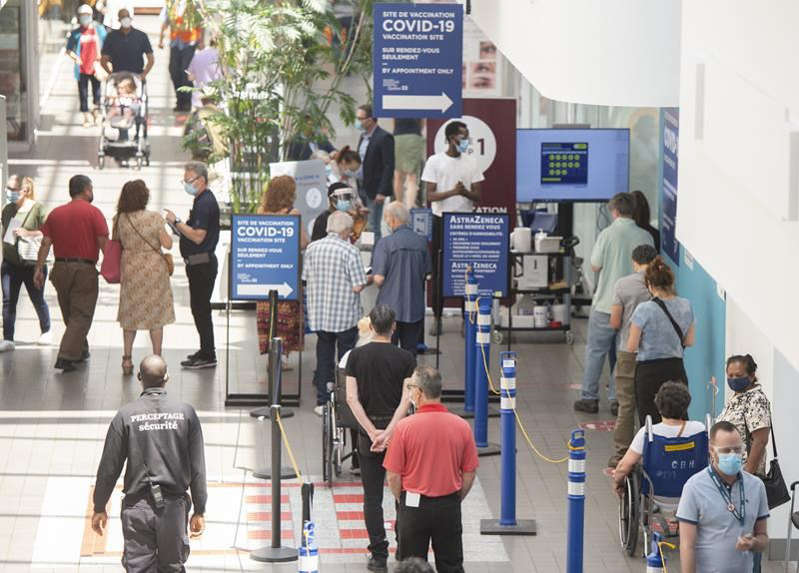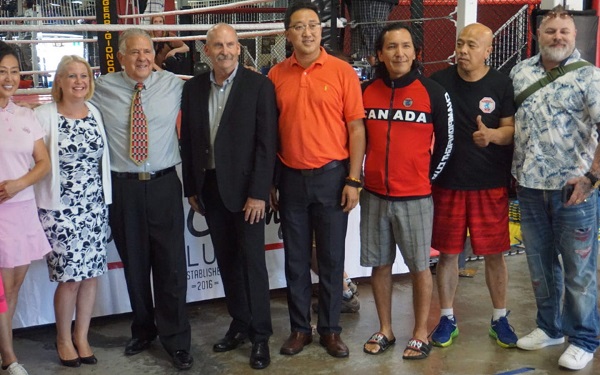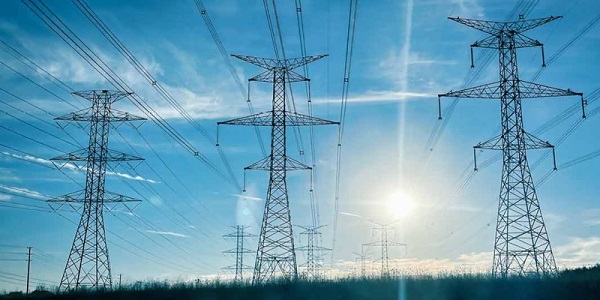National
Fentanyl, Firearms, and Failures: Canada’s Border in Crisis Mode
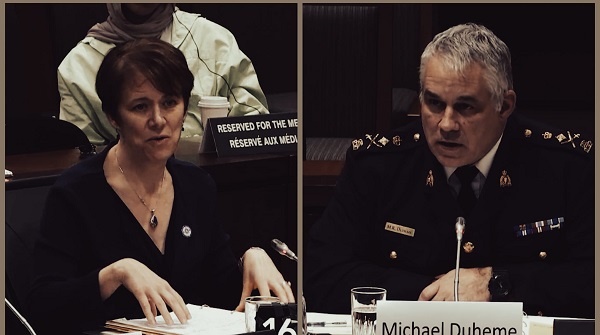
Opposition Exposes Legislative Gaps and Diplomatic Tensions as Trudeau Government Defends Record
In the latest session of the Standing Committee on Public Safety and National Security (SECU), the Trudeau government’s border security strategy faced fierce scrutiny.
MPs from the Conservative Party, Bloc Québécois, and NDP unleashed a barrage of criticism, exposing deep flaws in how Canada handles fentanyl trafficking, organized crime, and illegal migration. Witnesses from the Canada Border Services Agency (CBSA) and Royal Canadian Mounted Police (RCMP) offered opening statements aimed at highlighting their agencies’ efforts but quickly found themselves on the defensive, trying to justify their performance amid systemic failures.
CBSA and RCMP: Opening Statements Outline Growing Challenges
CBSA President Erin O’Gorman opened the SECU meeting with what can only be described as a pre-packaged, self-congratulatory performance. She boasted about “proactive” border security measures, highlighting joint operations with U.S. Customs and Border Protection and investments in drones and sensors. Let me translate that for you: a handful of success stories sprinkled with just enough tech jargon to distract from the gaping holes in Canada’s border defenses.
RCMP Commissioner Michael Duheme followed suit, painting a rosy picture of collaboration through Integrated Border Enforcement Teams (IBETs) and intelligence-sharing with the U.S. He acknowledged the challenges of tackling synthetic drugs like fentanyl but stopped short of explaining why Canada still lacks the resources to do so effectively. It was the same tired tune—effort without impact, talking points without solutions.
But the cracks in their narrative were impossible to miss. Both officials hinted at the enormity of the task they face and the glaring limitations of current resources and laws. And as the opposition MPs made clear, the gaps in leadership and accountability couldn’t be ignored. For all the talk of “progress,” the testimony revealed a border security system teetering on the edge of failure.
Organized Crime: Exploiting Systemic Weaknesses
Testimony revealed the alarming extent to which organized crime syndicates exploit Canada’s border vulnerabilities. Commissioner Duheme admitted that smugglers are using well-established routes to move firearms, fentanyl, and other contraband. Conservative MP Dane Lloyd wasted no time zeroing in on this issue, pointing out that while 750 firearms have been seized in 2024, countless others continue to flood Canadian streets, fueling gang violence and crime.
But it didn’t stop there. O’Gorman acknowledged that stolen Canadian vehicles are regularly smuggled out of the country, with some linked to terrorism financing. She admitted that CBSA’s enforcement efforts are hampered by a glaring legislative gap: ports are not legally required to provide inspection spaces for exports. Lloyd slammed this lack of oversight, declaring, “How can this government allow stolen vehicles to fund terrorism while ignoring calls for mandatory inspections?”
Fentanyl Crisis: A Growing Threat
The fentanyl epidemic emerged as another key issue, with MPs challenging the adequacy of current policies. O’Gorman highlighted CBSA’s success in seizing 4.9 kilograms of fentanyl in 2024, most of which was destined for Europe rather than the U.S. However, she acknowledged that small shipments of fentanyl precursors—dual-use chemicals legally imported and diverted to illicit production—remain a significant challenge.
NDP MP Alistair MacGregor pressed the witnesses on why the government has not tightened regulations on precursors. “We know how these chemicals are being exploited, yet the system remains open to abuse,” he said. RCMP Commissioner Duheme supported calls for stronger regulations, noting that criminal networks are becoming increasingly sophisticated in circumventing existing controls.
Conservative MP Doug Shipley didn’t hold back in his critique of the Trudeau government’s apparent complacency when it comes to border security. Referencing President-Elect Donald Trump’s scathing comments about Canada’s role in the U.S. opioid crisis, Shipley’s line of questioning cut straight to the heart of the issue: why does the government only react when faced with external pressure?
“Why does it take U.S. pressure and Trump’s rhetoric to get this government to act?” Shipley demanded, pointing to a troubling pattern where meaningful action on key issues like fentanyl trafficking only occurs after international embarrassment. The timing of Canada’s recent policy adjustments, including visa tightening and enforcement boosts under the Safe Third Country Agreement, raises serious questions about whether these moves were proactive measures or hasty reactions to avoid diplomatic fallout.
Shipley underscored the growing perception that the Trudeau government is more concerned with managing optics than tackling the underlying problems. “We have a border security crisis that has been ignored for years,” he said. “The Liberals have known about these issues—the fentanyl, the illegal crossings, the smuggling—and yet, nothing changes until a spotlight is shone on Canada’s failures.”
The backdrop of Trump’s rhetoric added fuel to the fire. His comments have not only strained Canada-U.S. relations but also amplified the stakes, with the threat of economic consequences like tariffs looming in the background. Shipley’s frustration echoed a broader sentiment among opposition MPs: that Canada’s leadership lacks the urgency and resolve to address border security challenges head-on, instead waiting for external forces to dictate the agenda.
The question Shipley posed wasn’t just rhetorical—it struck at the core of a government that has repeatedly been accused of putting politics over public safety. And in a system where criminal networks and traffickers are thriving, the consequences of inaction are no longer hypothetical—they’re devastatingly real.
Illegal Migration and Diplomatic Tensions
Illegal migration across the Canada-U.S. border also came under intense scrutiny. Bloc MP Kristina Michaud raised concerns about the surge in southbound crossings, which peaked at 7,000 individuals in mid-2024, a 680% increase since 2015. Although O’Gorman pointed to policy changes like visa tightening and the expanded Safe Third Country Agreement (STCA) as reasons for recent declines, opposition MPs remained skeptical.
Conservatives also linked the migration issue to potential diplomatic fallout with the U.S., particularly Trump’s proposed 25% tariffs on Canadian goods. “If this government can’t control the border, how can we expect to maintain good relations with our largest trading partner?” asked MP Glen Motz.
Canada’s Border Crisis: Solutions Are Clear, Leadership Is Missing
Let’s be real: the state of Canada’s border security isn’t just a policy issue; it’s a crisis. But if we’re going to have an honest conversation about solutions—and not just rhetoric—then we need to ask tough questions about what’s really required to fix this mess.
First, funding. The government loves to talk about its investments, but where is the money actually going? Testimony at SECU made it clear: the agencies on the front lines, like CBSA and the RCMP, are being asked to do more with less. They’re intercepting firearms, stolen vehicles, and fentanyl shipments, but they’re stretched thin. If we want real results, we need to ensure funding increases are targeted—not just wasted on bureaucracy. Drones, sensors, and data-sharing systems need to be deployed across the board, not in isolated pockets.
Then there’s the legislation. Canada’s laws are riddled with loopholes that make life easier for smugglers and harder for law enforcement. Case in point: ports aren’t even required to provide inspection spaces for exports. Let me repeat that—criminals are smuggling stolen vehicles and contraband out of the country because our laws don’t demand basic oversight at our ports. This isn’t rocket science. Mandate those inspections. Close the gaps on precursor chemicals. Hold shipping companies accountable. What’s the holdup?
And finally, diplomacy. The Liberals love to brand themselves as global players, yet our closest ally—the United States—is threatening tariffs because they don’t think Canada is doing enough on border security. Instead of caving to political pressure, how about showing some backbone? Share the data. Prove our contributions. Demand that the U.S. work with us as partners, not as scapegoats. But that requires leadership—real leadership—which seems to be in short supply in Ottawa.
The solutions are on the table. What’s missing is the political will to act. This isn’t just about protecting our borders; it’s about protecting Canadian families, Canadian jobs, and Canadian sovereignty. If Trudeau’s government can’t deliver, it’s time for leadership that can.
Excuses vs. Accountability on Border Security
When it comes to Canada’s border security, the political divide couldn’t be clearer. On one side, you have the Trudeau Liberals, spinning their tired narrative of progress, insisting they’ve done enough to secure our borders. On the other, you’ve got the opposition—Conservatives, Bloc, and NDP MPs alike—hammering away at the glaring failures of this government. And let me tell you, the contrasts are striking.
The Liberals came to this SECU meeting armed with buzzwords. They touted investments in drones, sensors, and new technologies. Liberal MP Anita Vandenbeld claimed these measures have led to “real results,” pointing to declines in illegal crossings and seizures of fentanyl. Sounds good on paper, right? But dig a little deeper, and you’ll see the cracks.
Conservative MPs like Doug Shipley and Dane Lloyd weren’t buying it. Shipley grilled witnesses on why, despite all this so-called progress, southbound illegal crossings into the U.S. are up 680% since 2015. “Why does this government always wait for a crisis before taking action?” he asked. Lloyd, meanwhile, exposed how criminals are exploiting Canada’s ports to smuggle stolen vehicles overseas—vehicles that fund international terrorism. And what’s the Liberal response? More consultations, more discussions. In other words, nothing.
Then there’s the Bloc’s Kristina Michaud. She hammered away at the government’s inability to close legislative gaps, like mandating export inspections at ports. Michaud even questioned whether the Liberals have the political will to enforce their own policies. That’s a devastating critique from Quebec’s representative, and it highlights the regional frustrations with Ottawa’s top-down approach.
Even the NDP, who often side with the Liberals, weren’t letting them off the hook. Alistair MacGregor zeroed in on fentanyl precursors, pointing out how weak regulations allow criminal networks to exploit Canada’s legal system. “When will this government stop talking about solutions and start implementing them?” he demanded. A fair question, given that these loopholes have existed for years.
So here’s the divide: the Liberals are clinging to their talking points, pretending their investments are enough, while the opposition is laser-focused on the systemic failures, legislative inaction, and diplomatic blunders that have allowed this crisis to spiral.
It’s a classic case of two narratives—one selling excuses, the other demanding accountability. And the real tragedy? While Ottawa debates, Canadian families are left to deal with the consequences of illegal drugs, rising crime, and stolen property funding terrorism. This isn’t just a political debate; it’s a national emergency.
Final Thoughts
Canada is a nation built on resilience, hard work, and a commitment to protecting its people. But what we’re seeing now is a betrayal of those values. Our borders aren’t just weak—they’re dangerously open to exploitation by criminals, traffickers, and opportunists. The SECU hearings made one thing abundantly clear: the Trudeau government has failed to defend the integrity of this country.
Lack of resources. Outdated laws. Political inaction. This isn’t governance—it’s negligence. While the CBSA and RCMP are doing everything they can with the tools they’re given, it’s not enough. Why? Because the leadership they need is nowhere to be found. Instead, we have Justin Trudeau—Ottawa’s talking head—more concerned with photo ops and platitudes than with keeping Canadians safe.
This is a system designed to fail, and Canadians are paying the price. It doesn’t have to be this way. With real leadership—leadership that prioritizes security, accountability, and action—we can fix this. We can close the legislative gaps, give our border agencies the resources they need, and restore Canada’s sovereignty.
It’s time to demand more from Ottawa. Not excuses, not buzzwords, but real, tangible change. Because this isn’t just about border security—it’s about protecting Canadian families, defending our economy, and safeguarding the values that define us as a nation. Canada deserves better. And if Justin Trudeau can’t deliver, then it’s time for someone who can.
Business
Out-Trumping Trump: A Mission Without a Win
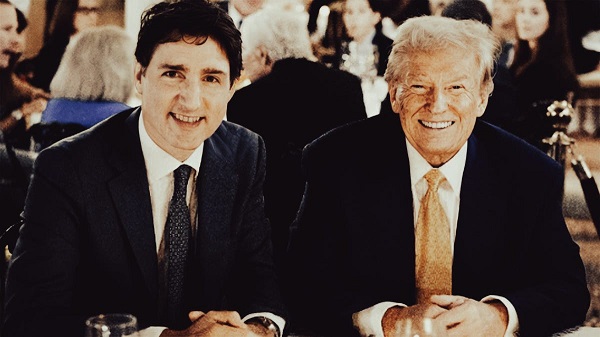
From the Frontier Centre for Public Policy
Diplomacy is often a world of planned whispers and subtle signals to communicate complex messages. So, even sleepy folks noticed when the PM made a much-publicized bold (and seemingly impromptu) move and flew to Florida to play Trump-Whisperer. What was the PM hoping to get from that appearance? The best way to evaluate such diplomatic moves is to measure results against expectations.
From start to finish, the trip read like Trump’s move, when the president flew in a similarly bold and unanticipated fashion to pacify the leader of North Korea, Kim Jong-un –the “Little Rocketman.” Trudeau’s trip to see Trump was modelled on Trump’s Korean trip; it was an attempt to out-Trump Trump. That was the expectation.
Amid talk of nuclear weapons deployment, Trump surprised the world in 2017 by going to North Korea to meet with the leader of the most insular country on the planet, a man the traditional media painted as an irrational lunatic. That is not unlike the image of Donald Trump that CBC and the MSM chorus in Canada present.
Similarly, Prime Minister Justin Trudeau surprised his followers and detractors, by flying to Mar-a-Lago, the capital of Trump’s world. The purpose was not to avoid a thermonuclear war but a trade war between the two countries. Such a trade war would hurt both countries but could devastate the “vibecessing” Canadian economy, which the Trudeau government is desperately trying to perk up expecting a general election in months.

The news was leaked once the Prime Minister was in the air heading south. A flood of commentators, who pretended to have no authority to speak on the subject, began to discuss what the trip meant and how brave and bold, silly or foolish, the Prime Minister was for undertaking it. This was like the attention surrounding Trump’s journey to North Korea.
The most surprising aspect of the announcement was that Trump had previously mocked and ridiculed the North Korean leader. While we don’t have direct insight into what the North Koreans called Trump at the other end, it was probably far from flattering. Consequently, it was hard to imagine how their interactions would play out. Many argued that the two men had nothing in common, often expressing this with professorial certainty.
There is no evidence that Prime Minister Trudeau has ever called Trump any nasty names in public, but Trump has not been as careful. After the G7 meeting in 2018, Trump referred to Trudeau as being “weak and dishonest.” However, we do know that Justin’s favourite boogeyman is the American “extreme-right,” of which progressive Canadians think Trump is the godfather. Whatever Trudeau and prominent government ministers think of Trump conservatives, they also think of Trump. There are many examples of how government members weaponized the concept. In October 2024, Deputy Prime Minister Chrystia Freeland addressed criticisms from Conservative MPs by stating she wasn’t intimidated by “juvenile playground insults from the wannabe MAGA maple syrup Conservatives.” Similarly, amid discussions about Prime Minister Trudeau’s leadership in October 2024, some government members referred to Conservative Leader Pierre Poilievre as “Maple MAGA” or “Canada’s Donald Trump,” expressing platitudes about threats to democracy. Readers might also recall how every lieutenant in the Trudeau legions pretended MAGA Trumpeteers and Trump himself had crushed Roe v. Wade and then claimed Canada’s Conservatives would do the same.
The PM, too, indulged in the same kind of attack during a July 2023 visit to the Baitun Nur Mosque in Calgary. During the event, Trudeau addressed concerns among the Muslim community regarding his support for the Transexual agenda and the claims of inclusive education in schools. He quickly invoked the anti-American narrative, shaming the man who posed the question for accepting what Trudeau labelled as radical right-wing American propaganda. Trudeau suggested that misinformation about Canada’s sexual education curriculum was being propagated by “the American right-wing,” which he argued was causing unnecessary division and fear among Canadians.
Many people were surprised to see Trump attempting what others had never tried in North Korea. That reaction was akin to that of Canadians who knew what Trudeau and his cabinet had said about Donald Trump and the American right. For Prime Minister Trudeau it was a victory to show pictures of his foray into Trumpian Mordor, giving him the chance to appoint himself the hero who will stop the detonation of a 20 percent tariffs trade bomb.
Immediately following the US election, the Trudeau cabinet quickly backtracked on the Trump insults. They suddenly forgot how they were presenting Trump as the figure behind Pierre Poilievre and his “extreme right-wing politics.” This was done with the same enthusiasm that Trudeau’s critics summon when joking about his supposed genetic connection to Fidel Castro.
Trump’s visit to North Korea reduced some of the heated rhetoric between the two countries; however, the North Korean Stalinist regime remains intact, along with its nuclear capabilities. Trump and Kim Jong-un did not sign any treaty to regulate nuclear weapons or establish lasting peace between their nations. Similarly, Prime Minister Trudeau returned from Florida without any significant outcomes.
There was no joint statement or announcement of an agreement. There were promises to continue discussions, which does not constitute a victory. All Trudeau can claim is a public relations victory like the one Trump touted after his return from North Korea, and that is not insignificant. But showing that Trump was not mean to him is hardly a diplomatic victory.
Trump provided Trudeau with opportunities for photo sessions without conceding anything or making any promises. He maintained his firm demand that Canada strengthen its border security to prevent drugs and potential terrorists from crossing freely. Trump takes satisfaction in the fact that a man he despises travelled to plead with him for leniency regarding his tariff threats. He is fully aware of this dynamic.
Prime Minister Trudeau may portray himself as someone who understands Trump well, but Trump holds the upper hand. He knows Trudeau is “weak” and desperately desires to maintain himself in power, despite his low popularity. Furthermore, Trump understands that Trudeau is willing to make significant political sacrifices to achieve a seemingly favourable resolution to the border issues. Trudeau badly needs a win, and Trump knows that Trudeau is willing to jeopardize his country’s economy to win. Consequently, Trump will likely capitalize on Trudeau’s vulnerabilities for all they are worth.
Trump understands that Trudeau is the ideal Canadian leader to engage with him, which should make Trudeau the least suitable person to negotiate with Trump if Canada’s interests are to be protected.
From that perspective, Trudeau’s trip to Florida is unlike Trump’s trip to North Korea. While both leaders sought to leverage their trips for political and public relations gains, the outcomes reveal the limitations of symbolic diplomacy and Trudeau’s inability to turn the trip into a long-term win. The latter is as much a function of the PM’s lack of skill as it is of the perception among voters that he is veritably done, no matter what.
Prime Minister Trudeau believes he is the only one who can deal with Trump from a position of strength, which is incorrect. His government has gimmicks but no strength left. That is why the prime minister pleads for a Team Canada approach to Trump and quickly condemns skepticism of his abilities as a national betrayal.
Trump will take advantage of that weakness –and if he can nail a man he despises as weak and woke, he will enjoy it the more. Out-Trumping Trump for domestic advantage was a fool’s errand.
Marco Navarro-Genie is VP Policy and Research at the Frontier Centre for Public Policy. He is co-author, with Barry Cooper, of COVID-19: The Politics of a Pandemic Moral Panic (2020).
National
Paul Wells: The Second Finance Ministers Club
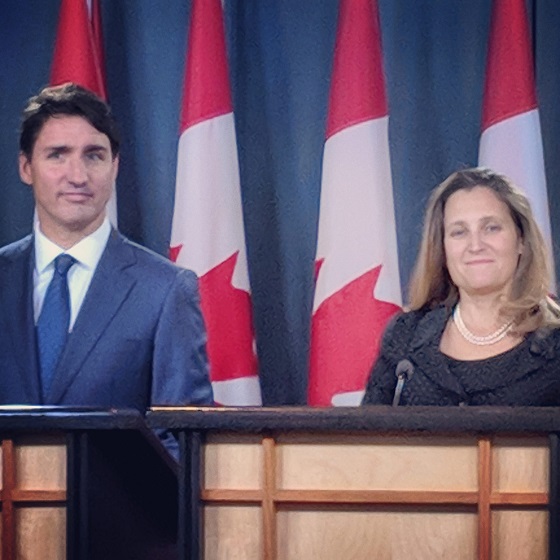
I want to write 5,000 words of narrative in the wake of Chrystia Freeland’s resignation, but we’re still in the middle of the story. Thoughts kind of pour out. I found myself telling La Presse, “‘What the f—k?’ has replaced ‘Hello’ as the standard greeting in Ottawa since Monday.” We’ll see whether they use that quote.
Here are some thoughts, from different angles. I don’t know whether Freeland’s resignation will blow over, the way Justin Trudeau’s last 20 messes did, because I don’t have a crystal ball, but I think Justin Trudeau hopes it’ll blow over. Because he always hopes it’ll blow over. I hear, as you do, rumours that the PM will resign.
On Monday night at the Laurier Club he didn’t look like he’d received the memo yet. On Tuesday his staff cancelled his year-end interviews, something I’ve never seen in 30 years in Ottawa. We’ll see.
Meanwhile, some thoughts.
1. A very British resignation
A standard conversational gambit in Ottawa this week is to point out that nobody’s ever seen a resignation letter like Freeland’s — I’ve given it some thought, and I’ve decided you’re a dink. (I paraphrase, barely.) Except that’s not quite true. Millions of people have seen dozens of resignation letters like it, because you see them every few weeks in the United Kingdom. And Chrystia Freeland was an editor in London for the Financial Times for years.
Canada is in some ways an unhealthily reticent country. I once covered an international summit where the only reason I knew anything the Canadian delegation had done was that I was sitting next to the journalists from France and I could overhear the French government’s briefings. Resignation letters here follow suit: it’s been a privilege, more time with my family, and out. You’re often left wondering, if you loved the boss so much, why leave?
But in England…
Rosie Duffield to Keir Starmer: “How dare you take our longed-for victory, the electorate’s sacred and precious trust, and throw it back in their individual faces and the faces of dedicated and hardworking Labour MPs?! The sleaze, nepotism and apparent avarice are off the scale. I am so ashamed of what you and your inner circle have done to tarnish and humiliate our once proud party.”
John Glen to Boris Johnson: “I can no longer reconcile my commitment to the role and to the financial services sector with the complete lack of confidence I have in your continuing leadership of our country… [R]ecent events concerning the handling of the appointment of the former Deputy Chief Whip, and the poor judgement you have shown, have made it impossible for me to square continued service with my conscience. The country deserves better…”
Nadine Dorries to Rishi Sunak: “You flashed your gleaming smile in your Prada shoes and Savile Row suit from behind a camera, but you just weren’t listening… But worst of all has been the spectacle of a prime minister demeaning his office by opening the gates to whip up a public frenzy against one of his own MPs…Since you took office a year ago, the country is run by a zombie Parliament where nothing meaningful has happened. What exactly has been done or have you achieved?”
This newsletter is my full-time job. Paid subscriptions at $5 a month or $50 a year are a great way to read all my work here.
2. The Zoom call
I resist biography as an analytical tool. People outgrow their backgrounds all the time.
But just about everybody who follows politics has been wondering how Trudeau could fire his most loyal lieutenant by a Zoom call three days before he needed her to deliver a crucial fall economic statement. If the Globe’s latest story is true, and he told her Mark Carney would take the job without knowing whether Carney will take the job, that’s even wilder. Who does that?
The short answer is, somebody who is used to getting his way. Then you look at Trudeau’s life and you think, why wouldn’t he expect to get his way?
The rich kid always knows the normies will cover for him. If he needs a ride, some kid with stars in his eyes will wave his keys and volunteer. If he’s hung over he can borrow the lecture notes. He shows up in racist makeup to yet another party — forcing every other person in the venue to decide how to respond — and once again nobody stands up to him or makes a fuss. Indeed, when the record of that behaviour threatens his political career decades later, there’ll be plenty of volunteers to criticize anyone who mentions the record, rather than criticizing the guy who acted like that.
He runs for the leadership of a national political party on a platform of “I’ll tell you what I stand for after I win.” He mentions carbon pricing precisely one time at his first national leaders’ debate. He dumps his electoral-reform promise at the first hurdle, and later, when asked about it, he blames the person who asks. He gaslights Canada’s first Indigenous attorney-general for months, but he is not particularly kinder to her replacement, who is ejected from Cabinet because, I don’t know, it’s Wednesday or whatever. He lets a 72-year-old man run for re-election and only after it’s over does he let the guy know he’s getting dumped from Cabinet.
He fires the Clerk of the Privy Council by news release while travelling.
In particular, if there’s anyone in the world he might have expected to tolerate the kind of high-handedness we’re hearing about Friday’s Zoom call, it’s Chrystia Freeland. Her eagerness to endorse him in the immediate aftermath of his latest cockup has been such a reliable feature of Canadian public life it’s devolved into a kind of shtick. SNC-Lavalin, 2019: “she has absolute confidence.” Blackface, six months later: “tremendous confidence.” WE Charity, 10 months after that: “The prime minister has my complete confidence.”
Perhaps only Jagmeet Singh has shown more confidence than Freeland, over the years, in Trudeau’s leadership. Given that record — and his own much longer record of taking advantage of others’ generosity — it’s not too much of a stretch to think that at some point he decided his deputy prime minister was just another easy mark.
Turns out that’s the kind of mistake he only needed to make once.
3. Speaking of Jagmeet Singh
He’ll qualify for his pension in 70 days. After his astonishing scrum on Monday, he might as well put it on a T-shirt.
4. After Trudeau
Say he quits. What next?
Here’s something I’m starting to hear from Liberals. I don’t believe I’m the first to write about it, but it hasn’t received enough attention yet.
Can the party ensure the legitimacy of its leadership succession process?
I suspect some large number of the presumed candidates for his succession won’t run. They haven’t exactly been a bold lot so far. But assume for the sake of argument that there are four or five candidates, and none has an insurmountable advantage.
The Liberal Party transformed its leadership-selection process for the 2013 race: preferential vote among “supporters.” Supporters didn’t need any record of involvement with the party, didn’t need to pledge any support, didn’t need to pay a dime in return for voting rights. Whee! Populist rush: 300,000 people registered as supporters, 130,000 voted. Trudeau won overwhelmingly on the first ballot. Of course: he was the only candidate most people voting in the contest had ever heard of.
After a big defeat, or with such a defeat looming, figure far less than half as many people would be involved next time. Say, very generously, 40,000 supporters.
How hard would it be to rig that contest for mischievous purposes or worse? Probably not hard enough. In a vote open to every random “supporter,” it would take only a few thousand, or tens of thousands, of supporters to capture a major national political party for any cause or faction that might want one.
I traded emails with a former senior Liberal organizer about all this today. Without prompting, this veteran of many leadership contests mentioned the need to “ensure… that groups not Liberal-friendly are not organizing to disrupt the democratic process within the Party.” Those groups could include supporters of one side in the Israel-Hamas dispute. Or proxies for a hostile regime. Or pro-life or anti-MAID or anti-vaccine groups. Or practical jokers: Could the process as currently constituted block a write-in campaign for Doris Day?
This newsletter is my full-time job. Paid subscriptions at $5 a month
or $50 a year are a great way to read all my work here.

-
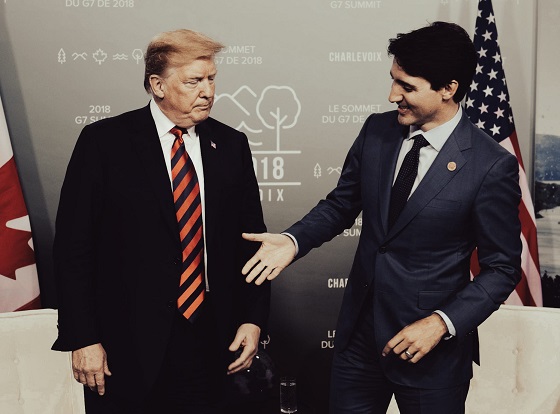
 Daily Caller2 days ago
Daily Caller2 days agoTrudeau’s Liberal Gov’t Tears Itself Apart As It Scrambles To Address Trump’s Tariff Threats
-
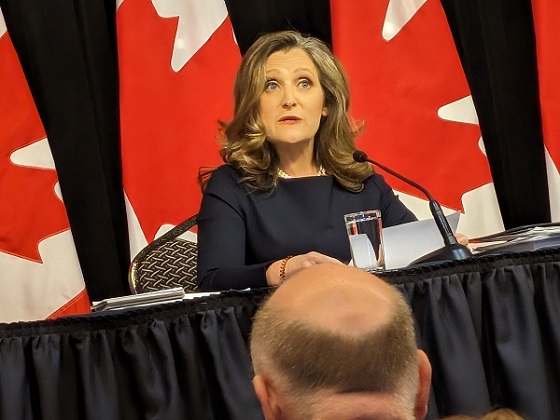
 National2 days ago
National2 days agoPaul Wells: Perhaps Freeland isn’t the victim here. Perhaps it’s Freeland who set Trudeau up
-
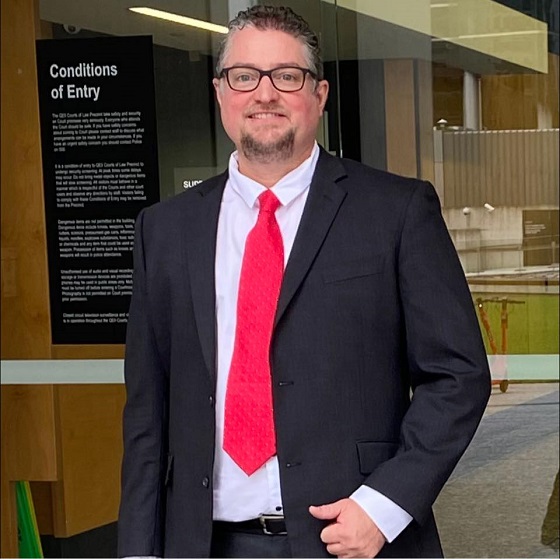
 COVID-192 days ago
COVID-192 days agoAustralian doctor who criticized COVID jabs has his suspension reversed
-
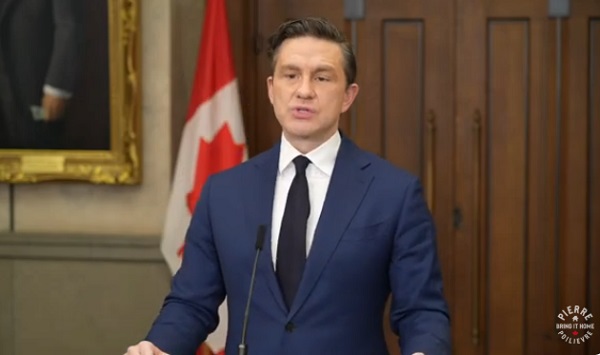
 National2 days ago
National2 days agoFreeland Resignation Reaction: Pierre Poilievre Speaks to Reporters in Ottawa
-
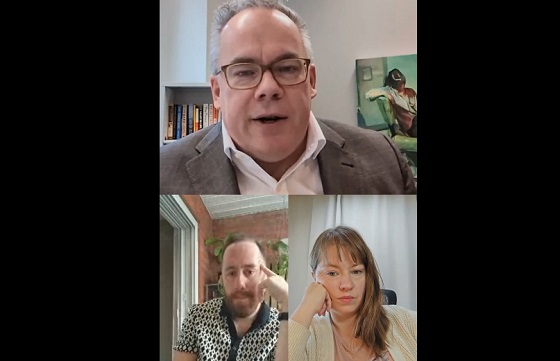
 National2 days ago
National2 days agoPaul Wells, Jen Gerson, and Justin Ling on Freeland and the Liberals’ future, if any
-
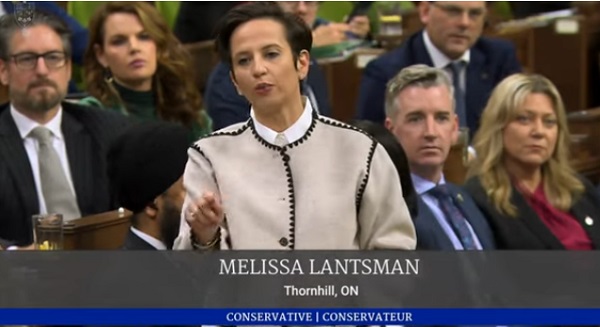
 National2 days ago
National2 days agoConservative Deputy Leader demands immediate election call
-
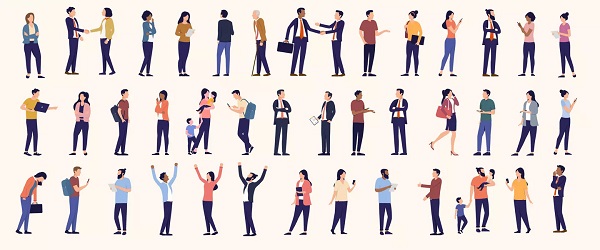
 Business2 days ago
Business2 days agoMassive growth in federal workforce contributes to Ottawa’s red ink
-
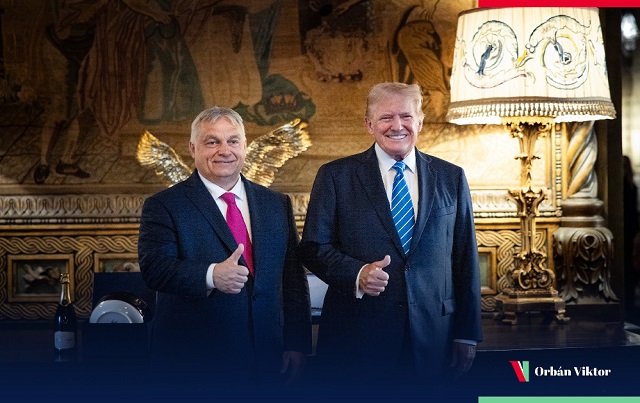
 conflict23 hours ago
conflict23 hours agoTrump has started negotiations to end the war in Ukraine






